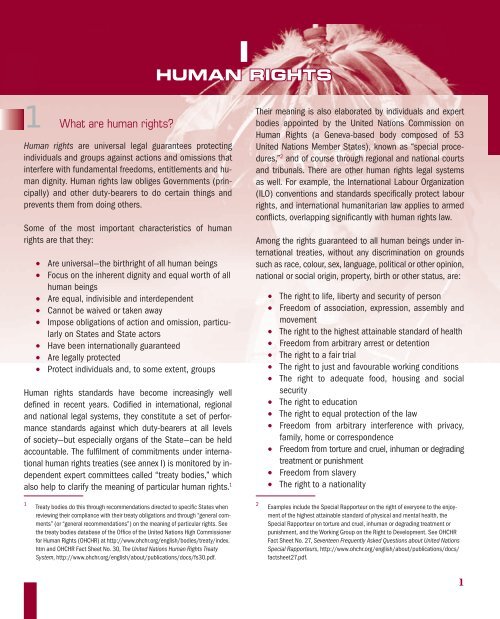Frequently Asked Questions on Human Rights-Based Approach
Frequently Asked Questions on Human Rights-Based Approach
Frequently Asked Questions on Human Rights-Based Approach
- No tags were found...
Create successful ePaper yourself
Turn your PDF publications into a flip-book with our unique Google optimized e-Paper software.
IHUMAN RIGHTS1 What are human rights?<strong>Human</strong> rights are universal legal guarantees protectingindividuals and groups against acti<strong>on</strong>s and omissi<strong>on</strong>s thatinterfere with fundamental freedoms, entitlements and humandignity. <strong>Human</strong> rights law obliges Governments (principally)and other duty-bearers to do certain things andprevents them from doing others.Some of the most important characteristics of humanrights are that they:Are universal—the birthright of all human beingsFocus <strong>on</strong> the inherent dignity and equal worth of allhuman beingsAre equal, indivisible and interdependentCannot be waived or taken awayImpose obligati<strong>on</strong>s of acti<strong>on</strong> and omissi<strong>on</strong>, particularly<strong>on</strong> States and State actorsHave been internati<strong>on</strong>ally guaranteedAre legally protectedProtect individuals and, to some extent, groups<strong>Human</strong> rights standards have become increasingly welldefi ned in recent years. Codifi ed in internati<strong>on</strong>al, regi<strong>on</strong>aland nati<strong>on</strong>al legal systems, they c<strong>on</strong>stitute a set of performancestandards against which duty-bearers at all levelsof society—but especially organs of the State—can be heldaccountable. The fulfi lment of commitments under internati<strong>on</strong>alhuman rights treaties (see annex I) is m<strong>on</strong>itored by independentexpert committees called “treaty bodies,” whichalso help to clarify the meaning of particular human rights. 1Their meaning is also elaborated by individuals and expertbodies appointed by the United Nati<strong>on</strong>s Commissi<strong>on</strong> <strong>on</strong><strong>Human</strong> <strong>Rights</strong> (a Geneva-based body composed of 53United Nati<strong>on</strong>s Member States), known as “special procedures,”2 and of course through regi<strong>on</strong>al and nati<strong>on</strong>al courtsand tribunals. There are other human rights legal systemsas well. For example, the Internati<strong>on</strong>al Labour Organizati<strong>on</strong>(ILO) c<strong>on</strong>venti<strong>on</strong>s and standards specifi cally protect labourrights, and internati<strong>on</strong>al humanitarian law applies to armedc<strong>on</strong>fl icts, overlapping signifi cantly with human rights law.Am<strong>on</strong>g the rights guaranteed to all human beings under internati<strong>on</strong>altreaties, without any discriminati<strong>on</strong> <strong>on</strong> groundssuch as race, colour, sex, language, political or other opini<strong>on</strong>,nati<strong>on</strong>al or social origin, property, birth or other status, are:The right to life, liberty and security of pers<strong>on</strong>Freedom of associati<strong>on</strong>, expressi<strong>on</strong>, assembly andmovementThe right to the highest attainable standard of healthFreedom from arbitrary arrest or detenti<strong>on</strong>The right to a fair trialThe right to just and favourable working c<strong>on</strong>diti<strong>on</strong>sThe right to adequate food, housing and socialsecurityThe right to educati<strong>on</strong>The right to equal protecti<strong>on</strong> of the lawFreedom from arbitrary interference with privacy,family, home or corresp<strong>on</strong>denceFreedom from torture and cruel, inhuman or degradingtreatment or punishmentFreedom from slaveryThe right to a nati<strong>on</strong>ality1Treaty bodies do this through recommendati<strong>on</strong>s directed to specifi c States whenreviewing their compliance with their treaty obligati<strong>on</strong>s and through “general comments”(or “general recommendati<strong>on</strong>s”) <strong>on</strong> the meaning of particular rights. Seethe treaty bodies database of the Offi ce of the United Nati<strong>on</strong>s High Commissi<strong>on</strong>erfor <strong>Human</strong> <strong>Rights</strong> (OHCHR) at http://www.ohchr.org/english/bodies/treaty/index.htm and OHCHR Fact Sheet No. 30, The United Nati<strong>on</strong>s <strong>Human</strong> <strong>Rights</strong> TreatySystem, http://www.ohchr.org/english/about/publicati<strong>on</strong>s/docs/fs30.pdf.2Examples include the Special Rapporteur <strong>on</strong> the right of every<strong>on</strong>e to the enjoymentof the highest attainable standard of physical and mental health, theSpecial Rapporteur <strong>on</strong> torture and cruel, inhuman or degrading treatment orpunishment, and the Working Group <strong>on</strong> the Right to Development. See OHCHRFact Sheet No. 27, Seventeen <str<strong>on</strong>g>Frequently</str<strong>on</strong>g> <str<strong>on</strong>g>Asked</str<strong>on</strong>g> <str<strong>on</strong>g>Questi<strong>on</strong>s</str<strong>on</strong>g> about United Nati<strong>on</strong>sSpecial Rapporteurs, http://www.ohchr.org/english/about/publicati<strong>on</strong>s/docs/factsheet27.pdf.1
















